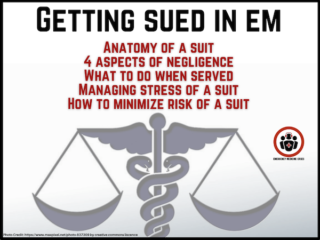Ep 165 Getting Sued in Emergency Medicine – Practical Tips
How many civil actions against Emergency Physicians does CMPA handle and what have been the outcomes? What are the 4 aspects of medical negligence and the anatomy of a legal action against physicians in Canada? What are the 3 stages of civil action in a medicolegal law suit in Canada? How should you respond when you are served with a medicolegal action? How can you minimize the stress associated with getting sued? What is the role of expert evidence in medical negligence actions? What strategies can we use to lower the risk of getting sued for medical negligence based on CMPA data and ED chiefs' opinions...



